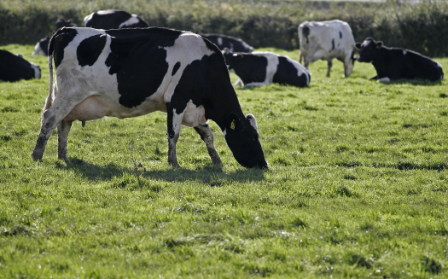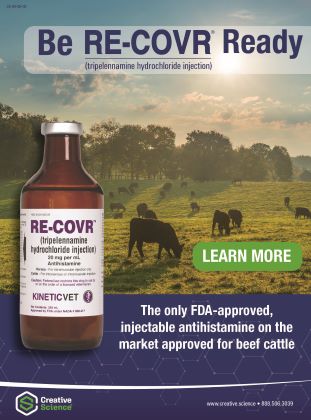New Research Demonstrates Benefits of Spectramast LC

New Study Demonstrates Positive Health and Financial Outcomes for Treating Nonsevere Gram-Negative Mastitis with Spectramast LC
The peer-reviewed research found a two-day treatment to be an efficacious protocol for dairies.
PARSIPPANY, N.J., — January 9, 2024 — Dairy producers and veterinarians can confidently implement mastitis treatment protocols against mastitis cases caused by Gram-negative bacteria with Spectramast® LC (ceftiofur hydrochloride) Sterile Suspension from Zoetis. Research from the University of California, Davis — published online in the Journal of Dairy Science (published in press Nov. 2, 2023) — showed that treatment of nonsevere (mild and moderate) cases of clinical mastitis caused by Gram-negative bacteria with Spectramast LC was effective in improving bacteriological and clinical cures, lowering mastitis recurrence, reducing use of supplemental therapy and minimizing mastitis-related culls and deaths.1
Conducted on three large dairy herds in California and using 415 nonsevere clinical mastitis cases caused by Gram-negative bacteria, the clinical trial compared outcomes between cows that received two-day intramammary treatment with Spectramast LC and cows that received no treatment. Results showed the effectiveness of two-day treatments with Spectramast LC was better than not treating.
Specific findings from the research included:
- 24.7% increase in bacteriological cures in treated groups at Day 14 compared with untreated groups1
- 46.8% reduction in mastitis-related cull and death rates in treated groups compared with untreated groups1
- $204-per-head reduction of mastitis-related losses in groups treated for two days compared with untreated groups1
“Early intramammary treatment of Gram-negative mastitis infections with Spectramast LC provides significant benefits compared with the option of not treating and assuming that cows would self-cure without consequence,” said Dr. Daniela Bruno, DVM, PhD, Dairy Advisor for University of California, Davis.
A prudent strategy would be to treat all cases of Gram-negative mastitis with Spectramast LC, and not attempt to distinguish mild cases from moderate cases, the research suggested.
“A case of non-severe Gram-negative mastitis has the potential to become a severe infection that requires more aggressive treatment, adding costs and delaying return to productivity,” said Juan Pedraza, DVM, Managing Veterinarian of Zoetis Dairy Technical Services. “Based on the research, you’re looking at improved cure rates, lower treatment costs due to the reduction in use of supplemental therapy, and most importantly, helping keep cows healthy and productive members of the herd.”
The dairy industry recognizes mastitis as one of the costliest disease conditions that dairy producers must manage. Gram-negative bacteria alone, especially coliforms like E. coli, Klebsiella spp., or Enterobacter spp., can pose a real threat to herd productivity, causing up to 35 percent of all intramammary infections on dairies.2,3 In one study, 66 percent of cultured samples initially tested negative but 34 percent actually were positive for a Gram-negative pathogen.3 Gram-negative bacteria can be elusive so it’s important to evaluate what an appropriate treatment protocol could look like for Gram-negative mastitis cases to help improve cow wellness outcomes and mastitis-treatment-related costs for the dairy industry.
“We continue to invest in new, practical on-label solutions and support research that will advance mastitis management protocols so veterinarians, producers and parlor employees can use them with confidence,” said Dr. Pedraza.
Spectramast LC offers extended therapy as its unique, flexible label for at least two and up to eight days to achieve a bacteriological cure for a broad spectrum of bacteria. In addition, the two-day pre-slaughter meat withdrawal for Spectramast LC is the shortest withhold time available, providing more options for greater management flexibility. Milk withdrawal time is 72 hours after the last treatment, regardless of how many days treatments are administered (2-8 days).
For more information about the study, check out the latest blog article. Talk to your Zoetis representative to learn more about mastitis treatment protocols with Spectramast LC.
About Zoetis
As the world’s leading animal health company, Zoetis is driven by a singular purpose: to nurture our world and humankind by advancing care for animals. After innovating ways to predict, prevent, detect, and treat animal illness for more than 70 years, Zoetis continues to stand by those raising and caring for animals worldwide – from veterinarians and pet owners to livestock farmers and ranchers. As a result, the company’s leading portfolio and pipeline of medicines, vaccines, diagnostics, and technologies make a difference in over 100 countries. A Fortune 500 company, Zoetis generated revenue of $8.1 billion in 2022 with approximately 13,800 employees. For more, visit www.zoetis.com.
Important Diagnostic Information:
SPECTRAMAST LC is intended for use in lactating dairy cattle only with the specified, labeled pathogens. To assure responsible antimicrobial drug use, it is expected that subclinical mastitis will be diagnosed using a positive culture, or other pathogen-specific test, in addition to any other, appropriate veterinary medical evaluation prior to treatment.
IMPORTANT SAFETY INFORMATION:
People with known hypersensitivity to penicillin or cephalosporins should avoid exposure to SPECTRAMAST LC. Product requires a 72-hour milk discard period and a 2-day pre-slaughter withdrawal period following the last treatment. Use of this product in a manner other than indicated on the label, or failure to adhere to proper milk discard period, will result in violative residues. In addition, to view the full Prescribing Information, click here.
1 Data on file, Study Report No. 20CRGMAS-02-01, Zoetis Inc.
2 Schukken Y, Chuff M, Moroni P, et al. The “other” Gram-negative bacteria in mastitis Klebsiella, Serratia, and more. Vet Clin Food Anim 2012; 28:23-256.
3 Oliveira L, Hulland C, Ruegg PL. Characterization of clinical mastitis occurring in cows on 50 large dairy herds in Wisconsin. J Dairy Sci 2013; 96:7538-7549.




